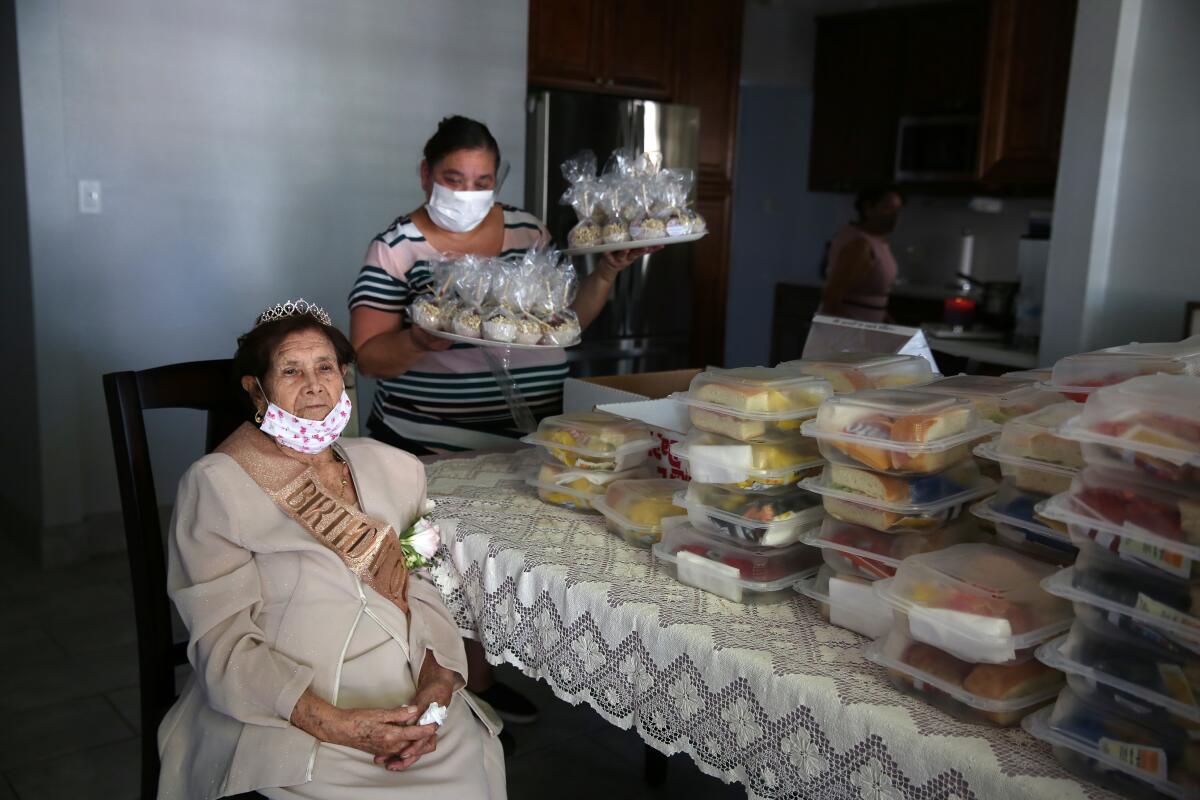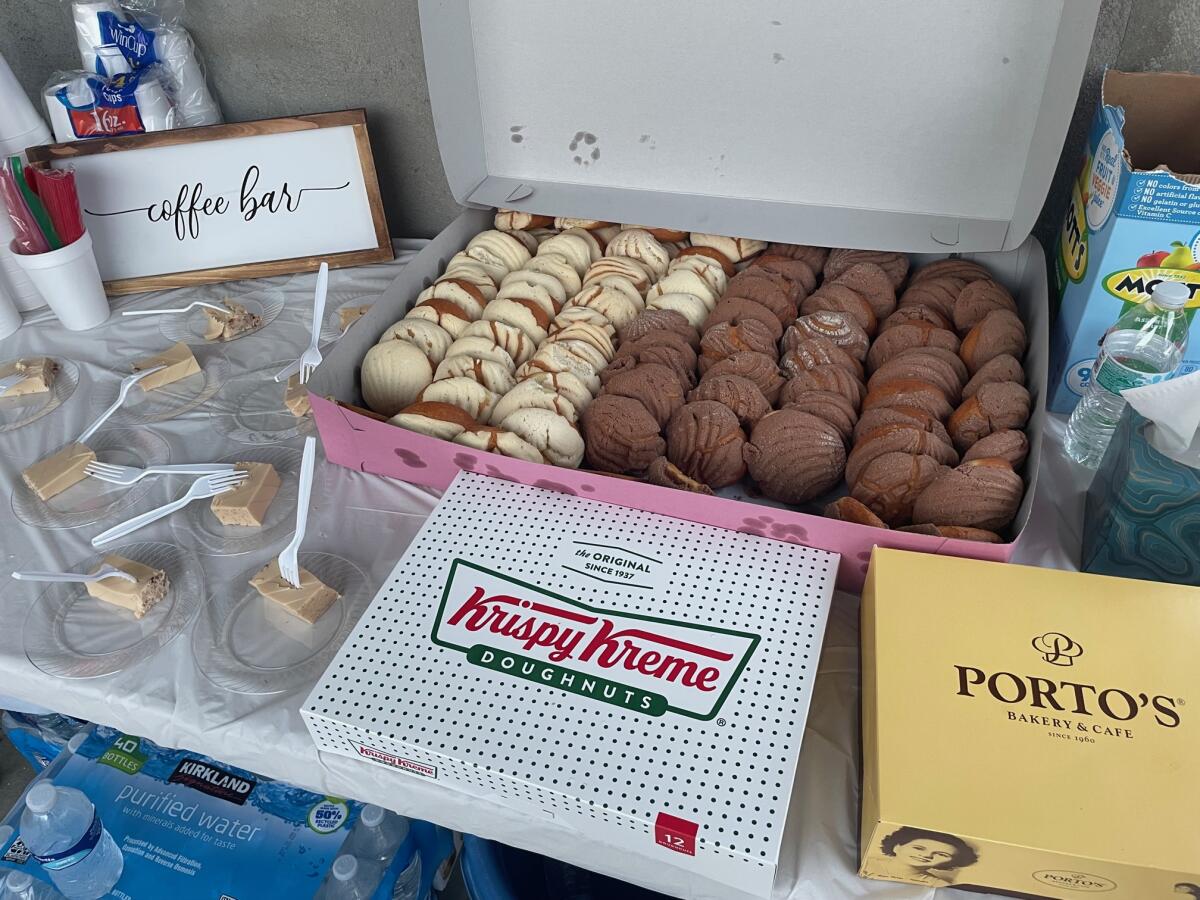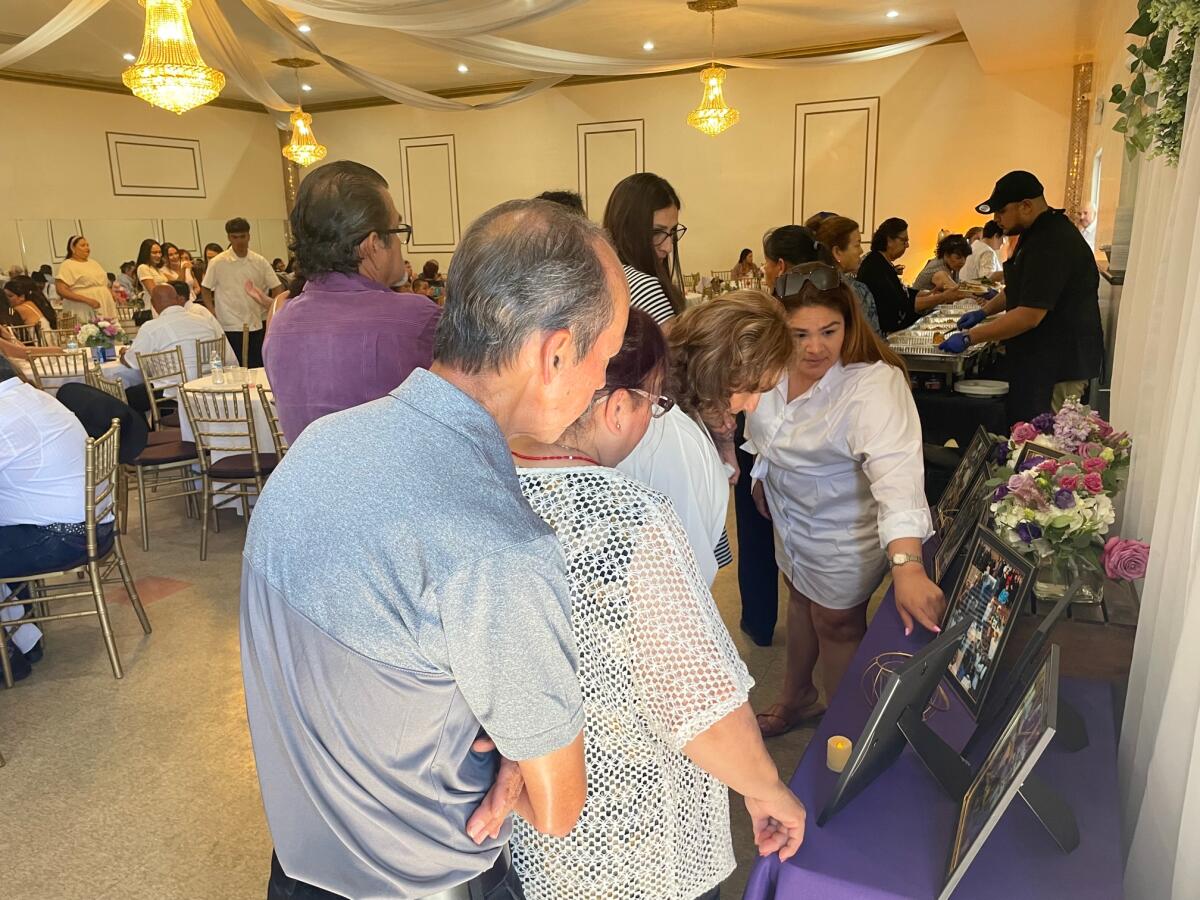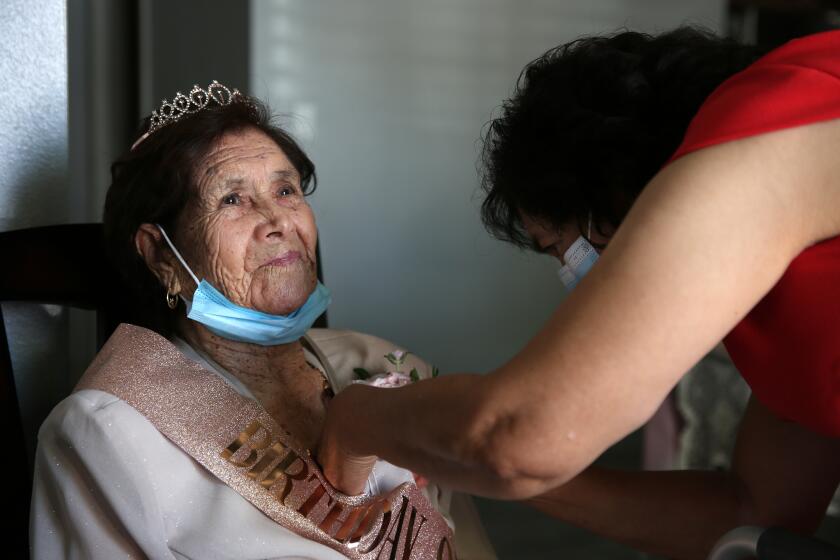One final goodbye to Grandma Arellano, with tacos, Porto’s and Domino’s

- Share via
When my paternal grandmother, Angelita Arellano Pérez, died at age 100 last month, her survivors — eight children, 32 grandchildren, 70 great-grandchildren and 21 great-great-grandchildren — were as prepared to deal with her death as we possibly could be.
We knew Grandma wanted her funeral at St. Alphonsus Church in East Los Angeles, where she had faithfully attended Mass for decades. A mariachi would serenade her casket after the service with classics like “Despedida con Mariachi” and “Amor Eterno.” The burial would be at nearby Calvary Cemetery, which Grandma had long ago chosen as her final resting place, inside a massive mausoleum.
She wanted us to mourn, but not too much. She instructed us to leave black suits and dresses in our closets and instead wear her favorite colors, white and purple. Grandma — we cousins called her that among ourselves instead of Abuelita because, assimilation — left everyone a legacy of love, hard work, faith and rancho libertarian smarts.
Really, there was only one thing to figure out on the day we laid her to rest:
What would we eat?
Angelita Arellano was a widow at 63, but she would never be alone. Grandchildren begat great-grandchildren begat great-great grandchildren, and she cooked for us into her 90s.
Food is one of the easiest, yet most profound ways, to comfort someone in their time of need. Whenever there’s a death among people from our ancestral region of Jerez, Zacatecas, an army of women — aunts, cousins, mothers, wives, sisters — feed the bereaved with traditional meals for days, if not a lifetime. My mother died four years ago, yet my maternal aunts — my tías Nacha, Paulita, Mela and Chayo — still send me enchiladas, chiles rellenos, beans and rice and so much more.
Early on, however, my female cousins reached a consensus that our tías wouldn’t lift a finger to feed anyone in the two weeks of mourning between my grandmother’s death on July 15 and her funeral on Aug. 3. These women had mothered us our entire lives; they deserved to rest after the death of their mami.
But how could we possibly live up to them?
My aunts are fabulous cooks and taught their daughters well. The spreads at family parties are worthy of a restaurant pop-up. But feeding our elders during a solemn time was a whole new task. My father and all his siblings are alive and in good health, so it’s not like we had much experience in confronting death with food. The only other Arellano to die in our lifetimes was our grandfather, José Arellano, who passed away in 1985 of a heart attack at 67. We were all kids then, or not even born.
Over texts and Apple Notes, we devised our plan.
First up was the novenario, the nine days of reciting the rosary that Mexican Catholics do to ensure that God will allow the deceased to enter heaven. About 100 people — family, friends and well-wishers — were expected each evening at my cousin Angie’s house in East L.A., just a few doors away from where Grandma lived. Each set of cousins picked a day to be in charge of and let the rest of us know what they planned to bring.
One night, it was Panda Express (my dad was excited for the chow mein, although he pronounced it “shaomain”). Another time, a family friend prepared birria de res, the beef stew we have eaten our entire lives but which has become ubiquitous in Southern California only in the last seven years. I footed the bill for 200 burritos from Burritos La Palma, the popular mini-chain with roots in Jerez.

The day I worked the buffet line, the menu was croissant sandwiches from Costco, Albertson’s fried chicken, Little Caesar’s pizza and leftover fried rice from Panda Express. We tried to cater from In-N-Out — the one fast-food chain that Grandma would allow herself to eat — for the final rosary, but they required a minimum order that ran into the thousands of dollars.
Like I always say, In-N-Out is overrated.
Mexican food purists might dismiss our meals as assimilated nonsense, but no one who joined us cared. We live in Southern California, after all. Our choices reflect our day-to-day lives. That’s why Porto’s guava pastries were on the menu every evening as dessert. So was my cousin Beatriz’s awesome red salsa spiked with chunks of avocado. One day, boxes of Krispy Kremes disappeared before the pan dulce.
On the final day, my cousin Griselda’s husband, Roberto Ceballos, enlisted some male cousins, cousins-in-law and my sister’s boyfriend to help him make and hand out tacos and fried quesadillas. The latter featured a delicious cheese with an orange rind that I thought was the sharp fromage our aunts and uncles bring back every time they visit Jerez.
“Sorry,” Roberto responded when I asked. “It’s Muenster.”
My aunts and uncles, who sat together in the front row during every rosary, were the first to eat every night. They were mythological in our eyes. None had attended high school. Most had paid off their homes on blue-collar salaries. All had children and grandchildren and great-grandchildren with college degrees, white-collar jobs and other markers of the American dream we all still very much believe in — because we’ve earned it.
Now, we waited on our fathers and mothers, not the other way around. The passing of our matriarch signified a passing of the torch to my generation to continue the Arellano way.
Angelita Arellano celebrated her 100th birthday this past weekend. Her family represents the East L.A. Mexican American dream.
The novenario meals were preludes to the funeral reception, held at Torres Banquet Hall near St. Alphonsus. Our family has visited the humble place dozens of times over the decades for weddings, baptisms, graduations and quinceañeras. Before the funeral, some of my cousins decorated tables near the stage that held photos of Grandma with every branch of the family.
She would see us eat one final time.
Outside, some of the next generation of cousins pounded Pacificos and Michelob Ultras, just like my generation did when we were their age. Inside, people chatted while extra-slow renditions of Beethoven’s “Für Elise” and Pachelbel’s “Canon in D” served as a soothing soundtrack.
Our uncles insisted on paying for lunch: a Mexican buffet from Eastside Tacos, the catering branch of East L.A.’s famed La Princesita. Aguas frescas, calabazas, enchiladas, chiles rellenos and chicken and beef fajitas, all with handmade tortillas, along with churros for dessert.
“Grandma would’ve loved all of this,” said my cousin, Araceli Arellano Hager, whom we all call Chely.
“She loved to cook,” added Maribel Bermejo, another Arellano cousin. “But she also taught us to step up and help.”
“It makes me feel good to continue these traditions,” said Leticia Navarro, yet another cousin whom we all call Leti. “Because I want to instill these traditions in my children. One thing that Grandma taught us is leave no one left unfed. That’s our love language. Con que haiga comida [As long as there’s food], we’re happy.”

As people began to line up for the buffet, we realized there was a problem. My uncles had ordered enough food for 200. There were easily 300 inside the banquet hall.
No one flinched. Chely and our cousin Nena handed out fried potato tacos and napkins. Maribel made an announcement that everyone start off easy so the food could last longer. Leti figured out where the closest pizzeria was — a Domino’s off Olympic Boulevard — and ordered 10 large pepperoni pizzas.
I reminded her of the time Grandma pulled a similar move — for the 70th birthday of my Tío Santos, Leti’s father, some years back. His children had pitched in for a elegant buffet of moles and carne asada. Grandma insisted it wasn’t enough food and asked that we also order pizza, especially for the kids who maybe didn’t care for traditional Mexican dishes. We all laughed ... until the pizza went first.
“That’s right, Gus!” Leti responded, as she asked her brother Rudy to tip the delivery man. “I totally forgot about that!”
We watched as the children of our cousins asked for slices. Then, the cousins who were our age. Finally, our tías.
Grandma would’ve been proud.
There were no tears, and there was enough food for seconds. The banquet went on for hours. And as I left, I remembered something that Grandma had said before, reminding us to enjoy ourselves while we can:
“If heaven is supposed to be a fiesta, why can’t we also celebrate here?”
More to Read
Sign up for Essential California
The most important California stories and recommendations in your inbox every morning.
You may occasionally receive promotional content from the Los Angeles Times.















